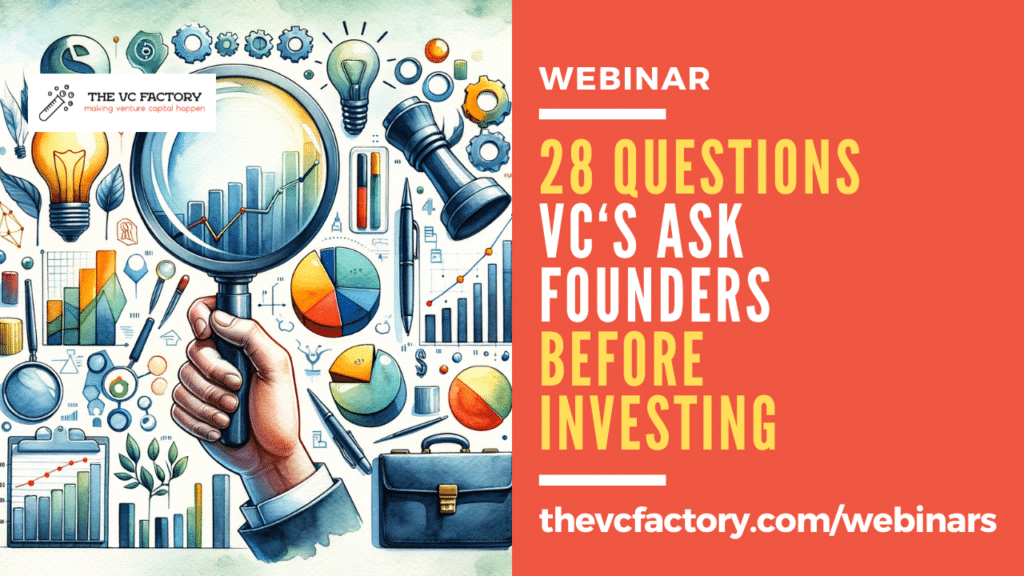28 Questions VCs Ask Founders Before Investing

Venture Capitalists receive hundreds of investment opportunities annually, making performing quick and effective exploratory due diligence crucial. They need to identify promising startups while swiftly avoiding potential pitfalls. However, data is scarce in early-stage VC. Investors rely on a set of questions to decide if they should probe further or move on to the next opportunity. In this post, I detail the 28 questions VCs ask during their first meetings with Founders, starting with the discovery questions that help form initial assessments. Moving forward, I shed light on the red flags and deal breakers VCs need to uncover early on. Finally, I address a critical, often-overlooked aspect: the inherent biases of Venture Capitalists.
In This Post
Accelerate Your Learning: Watch Our Webinar!
Don’t just read about it, immerse yourself in the content through our companion webinar for this post! Engage with a multimedia presentation, discover all the referenced sources, and have your questions answered live! Click the “Watch Now” button to access the webinar. (Members: click here).

Context: Managing The Funnel
Venture Capitalists navigate a relentless stream of investment opportunities. It’s not uncommon for early-stage VC firms to have hundreds of proposals crossing their desks over a year. In this high-velocity environment, the first challenge for a Venture Capitalist is the go/no-go decision: quickly determining whether an opportunity merits further consideration or should be dismissed outright. This initial stage is about managing the deal funnel efficiently, ensuring that only the most promising leads capture a Venture Capitalist’s limited time and resources.
Exploratory due diligence is the phase where VCs are most active. Unlike “confirmation due diligence,” which is often conducted by external parties to validate the details of an already attractive deal, exploratory due diligence is a more personal and discretionary process.
At this stage, VCs need to sift through minimal data to detect potential. They must rely on their expertise, intuition, and strategic questioning to unearth the opportunities with the most promise. It’s a dance between skepticism and optimism, where they must balance the fear of missing out on a unicorn with the pragmatism of avoiding the all-too-common duds.

Go Further: Why Venture Capital Due Diligence Fails
Deal funnel management is a systematic process. Jeff Bussgang, a VC at Flybridge Capital Partners in Boston, highlighted his firm’s deal funnel management process during a Harvard conference.
It starts with a question: Is this worth three minutes of my time? If a proposal can’t clear this first, low hurdle, it’s promptly ignored. Should it pique interest, the Venture Capitalist may invest half an hour for a deeper look. Each subsequent stage requires more time and resources, from an initial phone call to a series of in-person meetings.
At each step, the Venture Capitalist evaluates whether to proceed further down the funnel or to pass—sometimes with a suggestion to stay in touch. This structured approach ensures that by the time deep due diligence is warranted, the Venture Capitalist has already assessed the opportunity through a lens sharpened by experience and strategic inquiry.
Discovery Questions
During the discovery phase, Venture Capitalists initiate a shallow dive to validate an internal go/ no-go decision to dig further. At this stage, they don’t peel back the layers yet, but engage with Founders in a series of short questions about the company’s vision, strategy, and execution capabilities.
The questions in this phase span a wide array of topics, from the product and market to the team and financials. I’ve organized them by objective, not the order in which they are typically made.
Evaluating Alignment with The VC Fund’s Investment Strategy
Venture Capitalists deploy funds according to a strict, pre-determined investment strategy. They will not invest in a startup outside of their defined parameters. Therefore, they ask questions about a startup’s fit with their investment thesis. I detailed this topic in the post below.
“What does your company do?” is not just about understanding the product, but gauging whether the company aligns with the thematic focus of the fund.
“How much traction do you have?” helps VCs probe for evidence of market validation. They expect metrics that show user adoption, growth rates, and engagement levels, indicating a product-market fit. It also prepares the following question: the adequacy of the funding round with the startup’s development stage.
“How much are you raising?” gives insight into the Founder’s understanding of their capital requirements and whether the ask aligns with the fund’s average ticket. VCs anticipate a well-justified amount that correlates with a clear roadmap for growth.
Assessing Potential Returns
The potential for returns is a cornerstone of Venture Capital. Investors are short of time and must focus on the most promising opportunities, those “moving the needle.” In the post below, I explain how this metric is calculated and its significance in the VC decision process.
“How large is your market?” allows VCs to evaluate the total addressable market and the startup’s potential for significant scale. As Don Valentine, Sequoia’s Founder dubbed the grandfather of Silicon Valley, put it: “It is highly improbable to build a large company in a small market.”
“How do you make money?” seeks understanding the revenue model. Beyond a clear and sustainable revenue strategy with the potential for high margins, the objective is to ensure the company is scalable.
“What are your exit plans?” probes a realistic understanding of the exit landscape. Founders should articulate potential acquisition targets or the possibility of an IPO, showcasing their strategic foresight into how Investors might realize returns. Experienced VCs also use this question to test how long the Founders are ready to commit to the venture, impacting the exit strategy.
Managing Operational Challenges: The Execution Risk
Experienced VCs are apt at zeroing in on the execution risk offered in a business proposition, i.e., the obstacles the founding team will have to surmount to get to the next development stage. Great Founders are also good at communicating these challenges while articulating their vision.
Ideas are easy. Execution is everything.
John Doerr – Kleiner Perkins (Source: KPCB)
“Tell me about the founding team” probes into the core of the startup’s potential—its leaders. Venture Capitalists seek to understand the team’s dynamic, background, and the breadth of their skills and experience in relation to the execution risk identified. A strong founding team will navigate the rollercoaster journey of scaling a business. VCs look for Founders with a balance of technical know-how, business acumen, and a track record of perseverance and adaptability.

“What is your competition?” tests Founders’ awareness of the startup’s competitive landscape. Venture Capitalists look for a comprehensive understanding of both direct and indirect competitors, along with the startup’s strategy for differentiation and market penetration. Answers like “We have no competitors” reveal a lack of market knowledge or demand. Founders also often underestimate that the main competitor to a new product is often doing nothing.
“How does your solution work?” allows Venture Capitalists to evaluate more than the startup’s product or service. In the context of execution risk, this question is crucial for assessing the plug-and-play nature of the solution. Startup cemeteries are full of products requiring customers to change their habits and unnecessary gadgets appealing to few people.
“How much revenue will you generate in [2] years?” helps VCs understand how the current funding will propel the startup to its next milestone. They seek to ascertain whether the revenue projections align with achieving key objectives that would position the company for subsequent funding rounds.
Determining The Appropriate Round Size
Contrary to a common opinion, the main reason startups are unsuccessful in their fundraising efforts is not a lack of network but no eligibility to the VC model, closely followed by asking for too much money too soon. VCs must ensure that the amount asked aligns with the “experiment” that Founders must run to validate the next growth phase and the company’s current development stage.
“How will you spend funds raised?” reveals the Founder’s strategic acumen in allocating capital to areas that drive the company forward. VCs expect a plan judiciously balanced between product development, market expansion, talent acquisition, and other critical operations, focusing on reaching the next round of funding. One standard metric is to double the valuation in the next round.
“What is your technical roadmap?” delves into the company’s vision for product development. While a well-structured technical roadmap should outline upcoming features, improvements, and technological innovations that will provide competitive advantages and address current market needs, in most cases, Founders invest too much in tech at the expense of sales. This question may help spark a discussion on the size of the tech team.
“What is your next growth milestone?” is directly linked to the milestone approach I present in the post mentioned above. Clear and achievable growth milestones are essential to determine the adequate funding amount. Founders who think in milestones rather than abstract notions are better equipped to succeed.
“Show me your pipeline” is a request tied to the commercial effort necessary with the funds raised. Some Founders wrongly believe that recruiting a sales team will create customers. In most cases, Founders need to do the hard work of identifying their potential customers and whether they need the product before hiring a sales team to execute the plan.
You can’t get into the trap of paying for customer acquisition.
Aileen Lee – Cowboy Ventures (REAd more here)
Red Flags and Deal Breakers
The twin objective of this first questioning phase is to identify potential red flags that would make a VC deal unlikely:
- The Founders’ motivation behind the venture
- The strength of the relationship between co-Founders
- The company’s structure
- A “broken” capitalization table
- A lack of visible exit routes
- No one else is looking at the deal
I illustrate these points with concrete examples and suggestions for probing them during a short meeting.
The Questions Most VCs Never Ask
At the end of the webinar, I address the most crucial element of early questioning that only elite VCs address: their own biases, which heavily impact their assessment of the investment opportunity.
Conclusion: tl;dr
Venture Capitalists meeting a startup’s Founders for the first time must ask a battery of questions to quickly evaluate whether they should allocate more time to go deeper. They ask a series of discovery questions around the fit with their fund’s investment strategy, potential returns, execution risks, and whether the funding round size is appropriate.
VCs also try to identify potential deal breakers that will make the investment challenging, if not impossible. The Founders’ motivation, which I analyze using the promotion/prevention framework, is a crucial element of their analysis.
However, most VCs fail to reflect on their own biases—often the leading cause behind making mistakes of omission (missing a potential hit) and commission (investing in a startup that goes bankrupt).
Watch the webinar for a detailed take on all these points with real-life examples.



